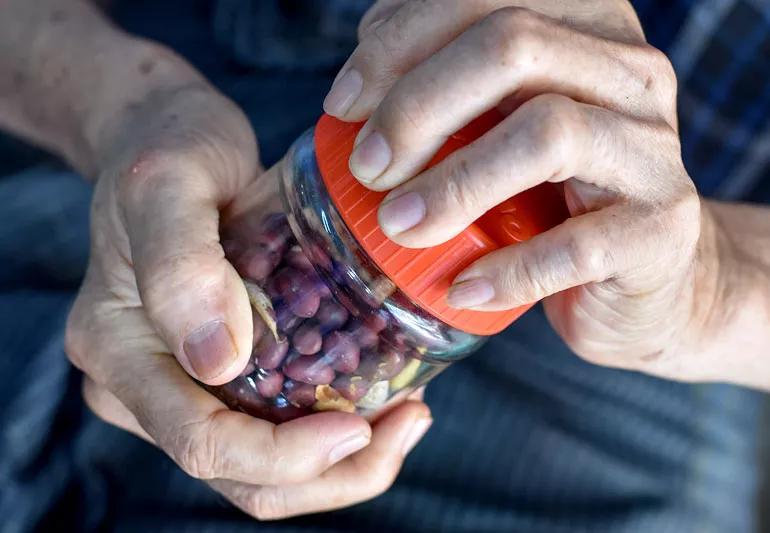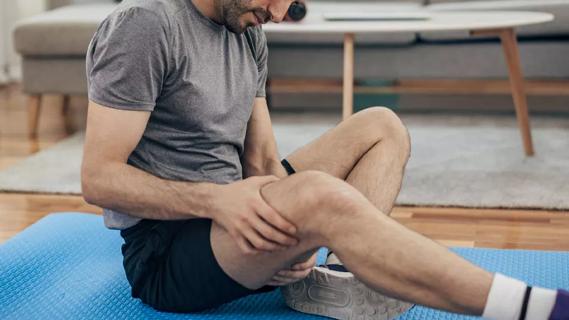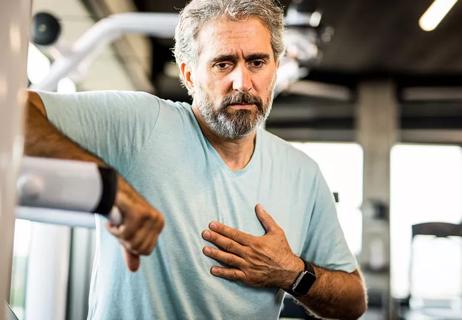Turns out your health really is in your hands

As we age, our muscles naturally weaken. Wear-and-tear impacts your whole body, including your knees, hips, back and more.
Advertisement
Cleveland Clinic is a non-profit academic medical center. Advertising on our site helps support our mission. We do not endorse non-Cleveland Clinic products or services. Policy
Keeping up a regimen of strength-training exercises is important to counter these effects. But one part of your body you may not consider actually matters more than you may think.
It turns out, your grip strength — the amount of force you have when you clench your hand around an object — is a huge indication of your overall health.
That’s right. Your grip strength is important for more than having a strong handshake and being able to open a pickle jar. Researchers call grip strength an “indispensable biomarker for older adults.” In other words, the strength you hold in your hands, wrists and forearms says a lot about how healthy you are. It’s also an indication of your risk for injury, mental health conditions and more.
“Grip strength naturally begins to decline around age 50, and maybe even earlier,” says geriatric medicine specialist Ardeshir Hashmi, MD. “People who maintain their grip strength age more slowly. They stay healthier longer and are stronger throughout their bodies.”
Dr. Hashmi explains why that is, as well as how your grip strength is related to your well-being, and what you can do to improve it.
Grip strength is measured by a device called a hand dynamometer. It’s a handheld device you squeeze as hard as you can.
Advertisement
It’s generally understood that a higher grip strength is associated with better health, and a lower grip strength is associated with poorer health. The exact cutoffs are still up for debate and differ based on age, BMI and other factors. Researchers in at least one study define weak grip strength as:
Until you begin to lose strength in your hands, you probably never really think about how important your grip strength is.
Our hands are critical for so many of our daily tasks. If you want to button your shirt, eat with a fork, write with a pen — it all requires a certain strength and dexterity in your hands and fingers.
But your grip strength is important for more than your day-to-day activities. Dr. Hashmi breaks down a few ways your grip is related to aging all over your body.
Grip strength is an easy-to-measure indication of how strong the rest of your body is. And keeping muscle strength throughout your body is important for your mobility, balance, endurance and more.
A strong body means you’re able to get out of the house more, get more exercise in your life and generally keep up with the world around you.
“The common denominator is that you lose strength as your muscle is replaced by fat tissue. It’s called sarcopenia,” Dr. Hashmi says. “If you’re losing strength in your hands and arms and, therefore, having a weaker grip, it’s an indication that’s happening all over your body.”
In one study, researchers found a relationship between grip strength and walking or climbing stairs. Men had more mobility issues when their grip strength was less than about 82 pounds. For women, it was 46 pounds.
And it’s a vicious cycle. Decreased mobility makes you less likely to be able to move your body in ways that will build up your muscle strength. And so your muscles continue to weaken. That leaves you at a greater risk for falls and fractures.
As you age, your immune system declines, leaving you more prone to infection. The word for that process is immunosenescence. It’s a fancy way of saying that the process of aging affects your ability to fight off infections.
A lowered muscle mass means your body loses some of its ability to mount a response to the viruses and bacteria that get you sick.
Research shows that poor grip strength is an indication of a weaker immune system, which can leave you more vulnerable to getting sick.
“Good grip strength is associated with immune system benefits,” Dr. Hashmi notes. “A weaker grip strength can be a sign that you’re more prone to infectious diseases, like COVID-19, RSV or the flu.”
And people who have a weaker grip strength are more likely to have more serious symptoms and complications from those illnesses. So, they’re at higher risk for hospitalization, too.
Advertisement
Dr. Hashmi says weak grip strength can also serve as a warning sign of a higher risk for chronic diseases. That’s in part because a lowered muscle mass makes it harder to exercise, leading to a sedentary lifestyle and a higher risk for frailty. That raises your risk of chronic conditions like:
The repercussions of decreased grip strength can be seen across your body. And they affect your mental state as well.
It makes sense: Weak grip strength is an indication of reduced muscle strength across your body. That leads to reduced mobility. And reduced mobility can lead to loneliness.
“We know that physical limitations can have a really negative impact on your mental health,” Dr. Hashmi says. “If you can’t go out and spend time with your friends and family, you can’t get out and do things that make you happy, you become more isolated. And isolation has a negative effect on your cognitive (brain) and emotional health.”
Researchers have connected weak grip strength to conditions like:
Advertisement
When you add it all up, your grip strength is essentially an indication of your overall health and longevity. In a way, your grip strength can almost predict your future health.
“I don’t think it’s too extreme to say that grip strength can be a predictor of life expectancy,” Dr. Hashmi states. “Lowered grip strength is a sign of frailty and associated with a high risk for dangerous complications. As those conditions and hospitalizations rack up, it takes its toll.”
The opposite is (encouragingly) also true. People with a strong grip strength are more able to stay active well into their older years. And there are some easy exercises that can help you maintain, and even improve, your grip strength.
Dr. Hashmi calls exercise the “penicillin against premature aging.”
“The more you maintain your grip strength, the slower the cells age,” he explains. “If you don’t maintain your grip strength, the cells actually start to metabolize and age faster. And that shows in what you’re physically able to do, or not do.”
So, how do you keep your grip strong?
Improving your grip strength is pretty simple: Grab a racquetball or squash ball and start squeezing. Dr. Hashmi says the goal should be to squeeze your hand and forearm muscles as much as you can, aiming for twice a day for at least 10 minutes per hand.
Advertisement
The size and material of the ball are important here. Dr. Hashmi says things like tennis balls are too big and may actually be damaging. Other kinds of squeeze balls may be too squishy to give your forearms the proper work. They don’t give you the right resistance.
Hollow squash balls and racquetballs, on the other hand, will do the trick just right.
There are other options on the market for grip strength that Dr. Hashmi says can work as well. Some are like resistance bands. Others are handles that you grip and squeeze. These products come in different sizes and resistances. Dr. Hashmi encourages first-time users to start with low resistance and work their way up to higher strengths to avoid injury.
As you get close to age 50, these daily hand exercises become increasingly important. But Dr. Hashmi suggests that any age is a good age to start.
Remember that your grip strength is an indication of your strength throughout your body. So, while strengthening your hands and forearms is important, that doesn’t mean you should ignore the rest of your body.
“Eating well, focusing on getting enough protein, and exercising your whole body is important to slowing the process of aging,” Dr. Hashmi adds. “Focusing on your grip itself is important, but it’s just one part of it. You want to keep your whole body strong and take care of your muscles throughout your body.”
Of course, we all have different opportunities and limitations when it comes to choosing exercises that are right for us. Depending on your health conditions, you may find that good exercises for your whole-body strength may be things like:
If you’re concerned about a weakening grip or want advice to improve your muscle strength, talk with a healthcare provider. They can help address any concerns and help you find ways to improve your muscle tone and improve your health overall.

Sign up for our Health Essentials emails for expert guidance on nutrition, fitness, sleep, skin care and more.
Learn more about our editorial process.
Advertisement

Whether it’s crushed ice, a chilled gel pack or frozen corn, you’ve got options

Getting close to their care team, investing in accessibility and implementing safe sleeping practices are just a few ways to support your child’s growth and development

Your child’s care team, nonprofit organizations, patient groups and more are here to support you

Stretching, heating pads and massage guns can provide quick relief

Seven doctor-approved ways to ease the pain

Your diet in the weeks, days and hours ahead of your race can power you to the finish line

Squats are foundational for building strength in your legs, glutes, quads and core muscles

A consistent walking program is an effective way to drop pounds and lose body fat

Even small moments of time outdoors can help reduce stress, boost mood and restore a sense of calm

A correct prescription helps your eyes see clearly — but as natural changes occur, you may need stronger or different eyeglasses

Both are medical emergencies, but they are very distinct events with different causes